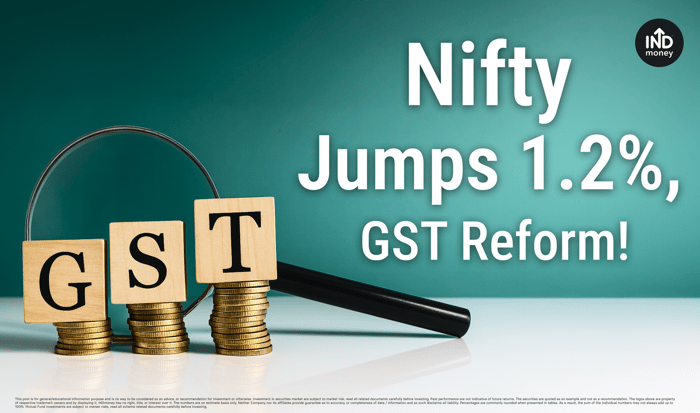
- Current GST Slabs in India
- What’s Expected in GST Reform?
- Expected Impact on Sectors
- Why Investors Are Excited
- Bottom Line
The Indian stock market had a strong day today. The Nifty 50 rose by 1.2%, crossing 24,900, while the Sensex climbed over 1,000 points. The excitement goes beyond today’s rally, it’s about what the government is expected to do next with the Goods and Services Tax (GST).
Current GST Slabs in India
Right now, India follows a multi-slab GST system:
- 5% GST - essential items like packaged food, edible oils, sugar, footwear below ₹1,000
- 12% GST - processed foods, cell phones, certain household goods
- 18% GST - the most common slab, covering electronics, restaurants, telecom, financial services
- 28% GST - luxury goods and “sin” items like high-end cars, aerated drinks, tobacco
Other Special Rates:
- 0% GST (exempted) - fresh vegetables, milk, education, healthcare
- 0.25% GST - rough diamonds
- 3% GST - gold, silver, precious stones
Effectively, India has four standard slabs (5%, 12%, 18%, 28%), plus special or zero rates for select categories.
What’s Expected in GST Reform?
Prime Minister Modi recently spoke about “next-generation GST reforms” designed to simplify the structure and boost efficiency. While not yet finalized, the expected GST structure might look like this:
- 5% slab: for essentials and common-use items
- 18% slab: for most goods and services
- 40% special slab: for sin and luxury goods such as tobacco, pan masala, and possibly online gaming
This means the current 12% and 28% slabs could be scrapped, leaving just two main slabs and one special rate.
Why Until Diwali?
The reform is expected to be approved and made effective around Diwali 2025, giving time for preparation and widespread impact.
Expected Impact on Sectors
- Daily Essentials: Goods taxed at 12% today may move down to 5%. That makes items like packaged food cheaper, giving households extra spending power.
- Automobiles: Small cars currently at 28% may fall under 18%. Prices could come down, boosting affordability for middle-class buyers. With festive demand around Diwali, auto majors like Maruti Suzuki and Tata Motors may benefit.
- Consumer Durables: Appliances such as ACs, TVs, fridges, and washing machines, now taxed at 28%, could shift to 18%. This 10% reduction may encourage families to upgrade their homes with new appliances.
- Insurance: Health and life insurance premiums may attract only 5% GST. Lower costs could bring more families into the insurance net, a win for financial protection.
- Sin and Luxury Goods: Tobacco, alcohol, and pan masala may be taxed at a flat 40%. While this keeps them expensive, it simplifies the tax structure by replacing today’s mix of GST plus cess.
- Stocks in Focus: Ashok Leyland surged over 6%, IFB Industries jumped 18%, and Relaxo Footwear advanced 10%.
Why Investors Are Excited
- Even though GST 2.0 is still expected, not official, markets are cheering the direction.
- Lower consumer taxes could lift demand across essentials, cars, and durables.
- Cheaper cars and appliances may drive festive-season sales.
- Simpler slabs mean fewer disputes and easier compliance for businesses.
- Macro tailwinds, India’s strong 7%+ GDP growth, an improved S&P rating outlook, and lower crude oil prices, add to the optimism.
Bottom Line
Today’s 1.2% rise in the Nifty reflects investor belief that India’s GST reforms will simplify taxes, lower prices, and unlock demand. Households could save more on daily essentials. Middle-class families may find cars and appliances easier to buy. Insurance could become more affordable. Businesses benefit from clarity and efficiency.
While these changes are still proposed and not yet finalized, the overall message is clear: India is moving toward a simpler, growth-friendly tax regime that supports both consumers and the economy.
Disclaimer
Investments in the securities market are subject to market risks, read all the related documents carefully before investing. The securities are quoted as an example and not as a recommendation.This is nowhere to be considered as an advice, recommendation or solicitation of offer to buy or sell or subscribe for securities. INDStocks SIP / Mini Save is a SIP feature that enables Customer(s) to save a fixed amount on a daily basis to invest in Indian Stock. INDstocks Private Limited (formerly known as INDmoney Private Limited) 616, Level 6, Suncity Success Tower, Sector 65, Gurugram, 122005, SEBI Stock Broking Registration No: INZ000305337, Trading and Clearing Member of NSE (90267, M70042) and BSE, BSE StarMF (6779), SEBI Depository Participant Reg. No. IN-DP-690-2022, Depository Participant ID: CDSL 12095500, Research Analyst Registration No. INH000018948 BSE RA Enlistment No. 6428. Refer https://indstocks.com/pricing?type=indian-stocks; https://www.indstocks.com/page/indian-stocks-sip-terms-and-condition for further details.